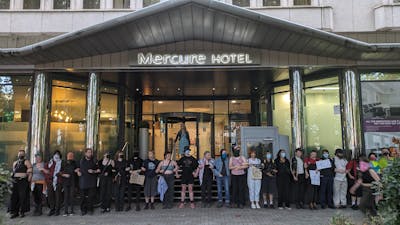Why Horror Cinema Should Matter to the Left
Alex Kidd
Friday, 8th July, 2022
Horror Without End is a project launched by Bristol resident Alex Kidd - a website dedicated to discussing class, capitalism, and horror cinema. This is their launch article; more content can already be found on their website.
Why horror cinema should matter to the left
Cinema has always had a lot to say about the world we live in.
We often find in film a medium used by creatives to explore a variety of political and social ideologies that are found in a particular time.
This has led to the development of a wide variety of different genre cinema trends which allow creatives to explore these themes through a variety of different lenses.
Take the brilliantly dark Dr Strangelove or: How I Learned to Stop Worrying and Love the Bomb (1964) for example.
In the 1960’s, the prospect of a nuclear world holocaust didn’t seem so much a fantasy as a near certainty especially following the close call of the Cuban missile crisis. Governments the world over set about preparing their often bizarre and utterly futile plans to ‘survive’ the oncoming nuclear assault.
Kubrick took the absurdity of this grim and apocalyptic situation and injected it with comedy. In this way, Dr Strangelove was able to demonstrate to the public the inherent absurdity of nuclear ‘defense’ planning as a concept, with even nuclear defense planners recognizing how close to reality the film had become.
This is a great example of how cinema reflects the societal trends in the wider world and different societal trends therefore need different genre lenses to be able to explore the varied aspects of a film’s subject.
Reality is a horrifying place
Horror has been able to fulfil a particular niche by allowing us to reflect upon the worst anxieties and fears that are to be found in any given society at a particular time.
Examples of this can be seen from the very beginning of horror cinema:
Dracula (1931) gave expression to the extremely prevalent xenophobic fears of the 1930’s , showing the extraction of the life of the society by an outsider.
Invasion of the Body Snatchers (1956) allowed the 1960’s American public who feared nothing more than the reds infiltrating and assimilating their free and eagle laden society, exploring this supposedly realistic prospect through… aliens.
Dawn of the Dead (1972) looked at the excesses of consumerism and played them out to their logical people eating extremes, in all its poorly make-up’d glory, for the world to see.
Horror is so effective as a lense for exploring societal norms as it often challenges pre-existing conceptions of a given society with deeply difficult and disturbing content, providing the audience a safe space in which to explore their darkest societal anxieties in a safe environment.
Horrors problematic past
As a result of horror reflecting the views of a given society at any time it has, to say the least, a problematic record of on-screen activities.
Zombies films have frequently been used to convey some deeply racist world views, such as White Zombie's (1932) presentation of Haitian voodoo (See Vox’s article ‘How the zombie presents America’s deepest fears’ for a breakdown).
Slasher films have often presented a deeply conservative and repressive approach to morality, particular around the portrayal of women and female sexuality on screen, creating a wealth of problematic material for feminists the world over to pick apart (such as Carol Clover’s brilliant book Men, Women, and Chainsaws).
Horror cinema can therefore reflect some of the most incendiary and repulsive fears of society.
Horror’s ability to challenge political hegemony
But horror can also be used to represent political views that are subversive to the dominant norms.
The most famous recent example of this is Jordan Peele’s masterpiece Get Out (2016).
With Get out Jordan Peele was able to get the heart of the day-to-day fears and anxieties faced by a whole community of society thanks to the terror of systemic racism. Peele challenged us as an audience to empathise with the twilight zone-esque reality titular character Chris’s (Daniel Kaluuya) specifically Black experience of the horror of the world we live in.
Peele’s bold vision wasn’t just a critical success , it was a commercial one as well, grossing a profit of $124.5 million dollars on a $4.5 million dollar budget.
Horror can therefore challenge the existing world view of the audience and not only that but there is clearly a growing audience of people looking to be challenged.
Our reality is horrifying
For those of us who see the world with a Left persuasion, the reality we live in is in and of itself a horrifying experience. You don’t have to look far to find something in the world that strikes fear into my bleeding heart:
The brutal working conditions to be found in sweatshop.
The drone like and often robotic work of Amazon warehouses and call centres.
The systematic destruction of the planet and displacement of native peoples to the benefit of profit.
It is no surprise then that given the world we all live in and with horrors ability to challenge the existing norms of a society and change audience perceptions, that the Left bloody loves horror.
The Lefty love for horror
Leftist writers across time have had a soft spot for the gothic, gorey and grim.
OG lefty Karl Marx described the system of Capital as that “dead labour, which, vampire-like, lives only by sucking living labour, and lives the more, the more labour it sucks” and anti-real world horror vanguardist Lenin called capitalism the “Horror without end”.
Recently we gave seen a resurgence of work exploring the links between horror and capital, like Harman’s Zombie Capitalism, describing the system as one ‘lumbering onwards without motivation or direction’ or Steven’s Splatter Capital shedding light on the gory mess capital has left in its horror cinematic wake.
Horror cinema creatives have then taken up this rich tradition of horror in the political left and thrown audiences around the world into the horror without end:
Whether it’s the commodification of the human body in Hostel (2005), the way the upper classes will congeal into one mass to protect their class interests shown in Society (1989) or the brutalities experienced under private healthcare portrayed in Saw VI (2009) , horror cinema has been a space to reflect on the horrors of life experienced in a specifical capitalist context.
The mission statement of Horror Without End
There is a clear need for leftist political dialogue to continue to contribute to discussions around horror cinema. With Horror Without End I am hoping to open a space where leftists the world over can explore the themes of class, working conditions and the dystopic present of our capitalistic world found right across the horror film genre.
Horror Without End is an explicitly leftist political space and will draw upon a wide variety of sources for inspiration. I am strongly influenced by Marxist political traditions but Horror Without End will not be limited to Marxist reading of film. In my writings I will be drawing upon a wide variety of sources to inform the discussions to be found, whether they be pop culture political writers, radical revolutionaries or (gulp) liberals.
I also recognises the importance of intersectionality to discussion and therefore, where a film’s dominant themes relate to race, feminism, sexuality (or anything beyond my own lived experience) I will try my best to provide resources for you to explore these themes from the perspective of a voice more appropriate to the discussion.
Finally, although all articles will be researched and I will try my best to draw upon a wide range of sources to inform my writing, Horror Without End is ultimately an expression of my political opinions and lived experiences.
I will make mistakes in my writings.
My views may change over time, as they ought to, and the overall tone of the content may shift as a result.
I am here to learn and will admit when I am wrong and I welcome the input, criticisms, and comments of you as the audience to help develop my own views of the leftist political world. If you read a piece and cannot believe that a theme has been ignored, please do leave a comment to share relevant resources so myself and the audience can continue to learn.
I look forward to growing Horror Without End as the space for all spooky leftists to explore the intersection of class, capitalism, and horror cinema together.
You can read more film analysis, editorials and listicles on horrorwithoutend.com.




